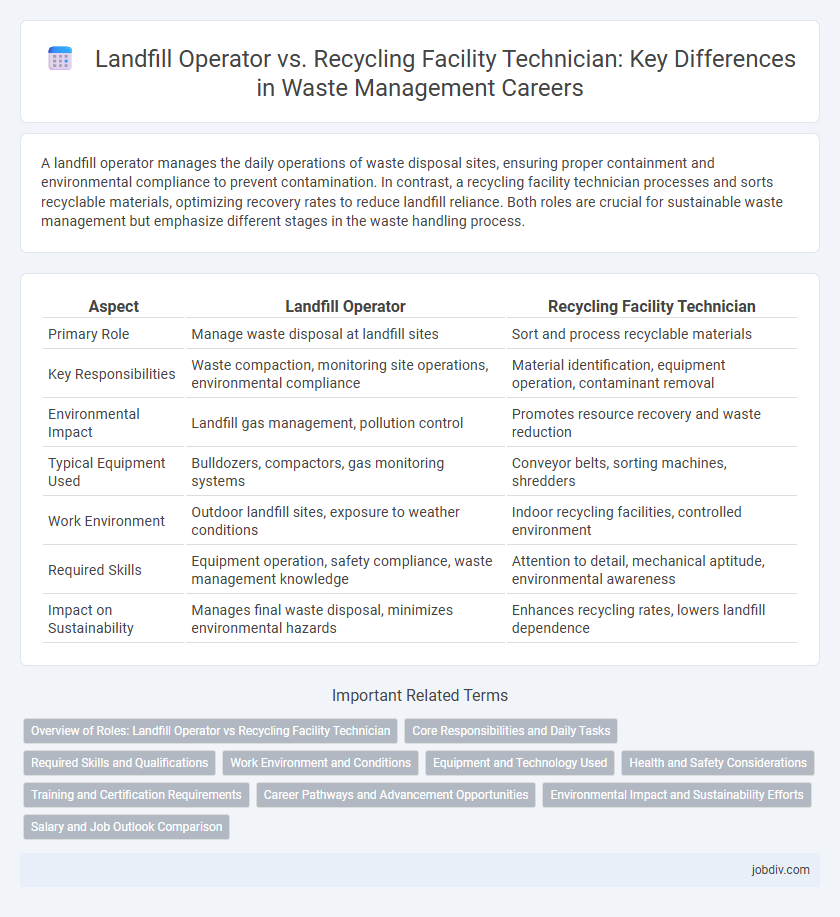A landfill operator manages the daily operations of waste disposal sites, ensuring proper containment and environmental compliance to prevent contamination. In contrast, a recycling facility technician processes and sorts recyclable materials, optimizing recovery rates to reduce landfill reliance. Both roles are crucial for sustainable waste management but emphasize different stages in the waste handling process.
Table of Comparison
| Aspect | Landfill Operator | Recycling Facility Technician |
|---|---|---|
| Primary Role | Manage waste disposal at landfill sites | Sort and process recyclable materials |
| Key Responsibilities | Waste compaction, monitoring site operations, environmental compliance | Material identification, equipment operation, contaminant removal |
| Environmental Impact | Landfill gas management, pollution control | Promotes resource recovery and waste reduction |
| Typical Equipment Used | Bulldozers, compactors, gas monitoring systems | Conveyor belts, sorting machines, shredders |
| Work Environment | Outdoor landfill sites, exposure to weather conditions | Indoor recycling facilities, controlled environment |
| Required Skills | Equipment operation, safety compliance, waste management knowledge | Attention to detail, mechanical aptitude, environmental awareness |
| Impact on Sustainability | Manages final waste disposal, minimizes environmental hazards | Enhances recycling rates, lowers landfill dependence |
Overview of Roles: Landfill Operator vs Recycling Facility Technician
Landfill operators manage the safe disposal of waste by overseeing landfill site maintenance, monitoring environmental compliance, and operating heavy machinery to compact and cover waste materials. Recycling facility technicians are responsible for sorting, processing, and preparing recyclable materials using specialized equipment to ensure efficient material recovery and reduce landfill dependency. Both roles are crucial in waste management, balancing waste disposal sustainability with resource recovery efforts.
Core Responsibilities and Daily Tasks
Landfill Operators manage waste disposal sites, focusing on monitoring landfill conditions, compacting and covering waste to minimize environmental impact, and ensuring compliance with safety and environmental regulations. Recycling Facility Technicians operate machinery to sort, process, and prepare recyclable materials for reuse, conducting quality control inspections and maintaining equipment for efficient material recovery. Both roles require adherence to environmental standards but differ in their emphasis on waste containment versus material reclamation.
Required Skills and Qualifications
Landfill operators require strong knowledge of environmental regulations, equipment maintenance, and waste management protocols to ensure safe landfill operations. Recycling facility technicians must possess skills in sorting processes, machinery operation, and material identification, along with certifications in hazardous materials handling. Both roles demand physical stamina, attention to detail, and adherence to safety standards, but recycling technicians often need more specialized technical training related to recycling technologies.
Work Environment and Conditions
Landfill operators work primarily outdoors in variable weather conditions, handling heavy machinery to manage waste disposal sites, often exposed to dust, odors, and noise. Recycling facility technicians operate indoors within recycling centers, sorting, processing, and maintaining equipment, typically in controlled environments with strict safety protocols to manage exposure to contaminants. Both roles require adherence to safety standards, but landfill operators face more physically demanding and fluctuating environmental challenges compared to the more regulated, equipment-focused settings of recycling technicians.
Equipment and Technology Used
Landfill operators primarily use heavy machinery such as bulldozers, compactors, and excavators to manage waste disposal and maintain site stability. Recycling facility technicians utilize advanced sorting technologies including conveyor belts, magnetic separators, optical sorters, and shredders to efficiently separate and process recyclable materials. The equipment in recycling facilities emphasizes automation and material recovery, while landfill operations focus on volume management and environmental containment.
Health and Safety Considerations
Landfill operators are exposed to hazardous gases, heavy machinery, and potential waste-related pathogens, requiring rigorous personal protective equipment (PPE) and continuous monitoring of air quality to mitigate health risks. Recycling facility technicians face exposure to dust, sharp objects, and chemical residues, necessitating strict protocols for handling materials and maintaining ergonomic workstations to prevent injuries. Both roles demand comprehensive safety training and adherence to environmental regulations to ensure worker health and operational safety.
Training and Certification Requirements
Landfill operators typically require training in waste management regulations, environmental safety, and equipment operation, often needing certification from agencies like the Solid Waste Association of North America (SWANA). Recycling facility technicians must complete specialized training in material sorting, contamination control, and machinery maintenance, with certifications such as those offered by the Recycling Council or waste management organizations. Both roles demand compliance with Occupational Safety and Health Administration (OSHA) standards to ensure safe work environments.
Career Pathways and Advancement Opportunities
Landfill operators manage the day-to-day operations of waste disposal sites, focusing on environmental compliance and site maintenance, while recycling facility technicians specialize in sorting and processing recyclable materials. Career advancement for landfill operators often leads to supervisory roles or environmental compliance management, whereas recycling technicians can progress to roles in process optimization or sustainability program coordination. Both career pathways offer opportunities for specialization, with increasing emphasis on waste diversion strategies and green technology integration.
Environmental Impact and Sustainability Efforts
Landfill operators manage waste disposal by containing and isolating non-recyclable materials to minimize soil and water contamination, though their operations inherently contribute to methane emissions and long-term environmental degradation. Recycling facility technicians actively sort, process, and repurpose materials, significantly reducing landfill volume and conserving natural resources by enabling material reuse. The sustainability impact of recycling technicians surpasses landfill operators by promoting circular economy principles and reducing greenhouse gas emissions associated with raw material extraction and waste decomposition.
Salary and Job Outlook Comparison
Landfill operators earn an average annual salary of $40,000 to $55,000, with job growth projected at 5% over the next decade. Recycling facility technicians typically make between $35,000 and $50,000 per year, but the industry expects a higher growth rate of approximately 7% due to increasing environmental regulations and demand for sustainable waste management. Both roles offer stable employment opportunities, yet recycling technicians benefit from stronger job prospects linked to expanding recycling initiatives.
Landfill Operator vs Recycling Facility Technician Infographic

 jobdiv.com
jobdiv.com